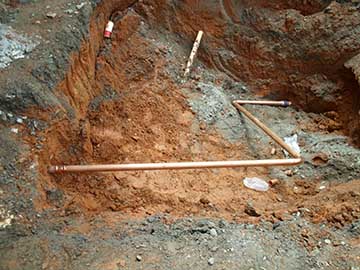
Copper is one of the most popular types of metal to use for plumbing. However, some people are wary about this because it can corrode and develop leaks. But does this mean that they’ll also be leaking harmful bacteria? It can if there is corrosion in the copper pipes.
Copper pipes that are corroded can create bacterial biofilms which can lead to health problems for anyone who drinks water from those corroded pipes. Corrosion is commonly caused by high levels of dissolved oxygen, improper installation of pipes, improper electrical grounding, high flow rates and also if there’s a lot of sediment in the water that is passing through those pipes. (souce: US National Library of Medicine and uswatersystems.com)
Do Copper Pipes Contaminate Water?
In general, copper pipes are considered safe for water transmission, but there are certain circumstances in which copper can leach into the water supply and cause contamination.
Copper can get into drinking water either by directly contaminating well water or through corrosion of copper pipes if your water is acidic. – CDC.org
Our bodies need SOME copper, but ingesting too much, just like most anything else, can be harmful. It can cause diarrhea, vomiting, nausea, stomach cramps, kidney disease and damage to your liver.
How Can You Tell If Your Water Has High Levels Of Copper?
Is your water safe to drink? What about the pipes in your house?
Copper pipes have been a popular plumbing material for decades, but are they safe for drinking water? The answer is that it depends. Water can become contaminated if there are leaks or rust (corrosion) on the copper pipe. This is because of how corrosive excess copper can be to other substances, including human skin and tissue.
There are some signs that you can look for to identify if your drinking water has high or low levels of copper. We strongly recommend that you get your water tested to definitively identify the levels of copper in your drinking water system. You can also speak to your plumber about any of the home test kits and which ones are recommended to test your home’s tap water.
Signs Of High Levels Of Copper In Your Drinking Water
- If you are noticing a metallic taste in your water, it could be due to high levels of copper. The United States Environmental Protection Agency (EPA) recommends that people with plumbing fixtures get their drinking tap sampled and tested at yearly intervals because they may pose an increased risk for infection when exposed over time.
Signs Of Low Levels Of Copper In Your Drinking Water
- If you notice a green or blue stain on your tap, this is simply the result of low levels copper, which leaves behind this pleasingly aesthetic coloration but does not add any taste or smell when drinking from it!
Can Copper Water Pipes Cause Health Problems?
Copper is a mineral that humans need to survive, but too much can be harmful. Too much of most anything is not good for your health, right?
Eating or drinking too much copper can cause vomiting, diarrhea, stomach cramps, nausea, liver damage, and kidney disease. People with Wilson’s disease and some infants (babies under one year old) are extra sensitive to copper. Their bodies are not able to get rid of extra copper easily. – Minnesota Department of Health
Elevated levels of copper for 14 days or more can lead to health problems such as permanent kidney and liver damage in infants under the age of 1 year. In adults, high concentrations result from digestive disorders like nausea vomiting diarrhea stomach cramps. In addition, people who have Wilson’s disease are unable to excrete excess copper, and if it is not detected can cause death.
Are Copper Pipes Safe For Drinking Water?
Copper pipes that haven been in your home for many years or have begun to corrode can contaminate your water but if the copper pipes are new or only a few years old, then there should not be any problems with the safety of your drinking water. Again, you can have your water tested, yearly would be great, to assess it’s safety.
How Can You Prevent Copper Pipes From Corroding?
The first step to stopping corrosion in your copper pipes is to know what causes it in the first place. The most common cause is the chemistry of the water that runs through those pipes. Namely, the pH levels.
- Low pH levels in the water (should be between 6.5 and 8.5 pH)
- If water heater has iron deposits.
- Improper soldering of the copper pipes can also cause erosion corrosion.
- Water moving at high speeds through a pipe can wear away copper from the interior.
- If water is left in the copper pipes for a long time – this could also cause corrosion.
Avoiding these can help you to keep your copper pipes in good condition for much longer.
If you have any questions about your copper water pipes or are having some problems with it, call Atlantis Plumbing today at 770-505-8570. We are available 24 hours a day, 7 days a week.